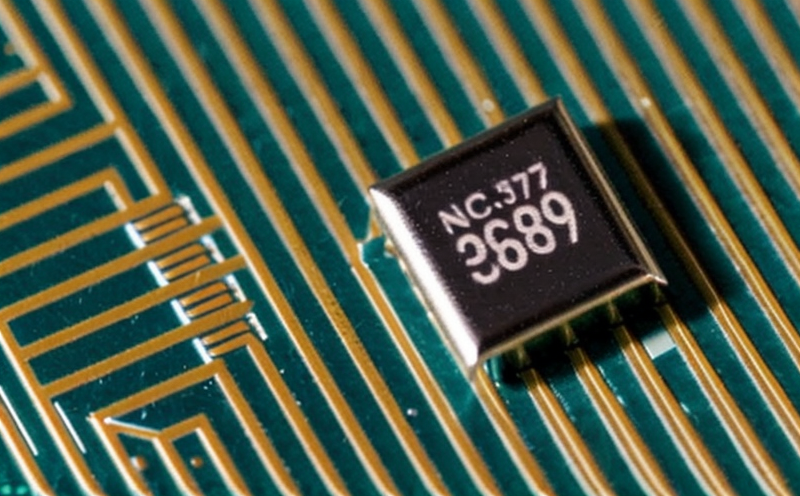IEC 60749-34 Power Cycling Endurance Testing
The IEC 60749-34 standard is a critical component of semiconductor and microchip reliability testing. This test evaluates the endurance of power cycling, which simulates real-world operating conditions to ensure that semiconductor devices can withstand repeated cycles of on/off operation without failure.
Power cycling tests are essential for ensuring that microchips operate reliably under varying environmental conditions. These tests help manufacturers and quality assurance teams identify potential weaknesses in the design or manufacturing process, allowing for improvements before products reach the market. This is particularly important for applications where reliability is paramount, such as automotive electronics, consumer devices, medical equipment, and industrial machinery.
IEC 60749-34 specifies detailed procedures for testing microchips under controlled conditions to determine their resistance to power cycling stress. The test involves subjecting the device to a series of on-off cycles at specified temperatures, voltages, and current levels. This process simulates the operational environment where the chip will be used, ensuring that it meets the required performance standards.
The IEC standard is designed to provide a robust framework for testing, allowing for consistent results across different laboratories and regions. By adhering to this international standard, manufacturers can ensure their products meet global quality and safety requirements. This reliability testing not only enhances product quality but also reduces the risk of costly failures in end applications.
For semiconductor and microchip manufacturers, compliance with IEC 60749-34 is crucial for maintaining a competitive edge in the market. By demonstrating that their products can withstand rigorous power cycling conditions, they build trust with customers and regulatory bodies alike. This testing process also helps to ensure consistent product quality across production batches and geographical regions.
In addition to enhancing product reliability, IEC 60749-34 compliance is often a requirement for meeting industry standards and regulations. For example, in the automotive sector, many vehicle manufacturers require suppliers to demonstrate that their components can withstand extreme environmental conditions. Similarly, medical device companies must ensure that their products meet stringent quality control measures.
IEC 60749-34 testing is particularly valuable for R&D teams working on new designs or improvements to existing products. By identifying potential issues early in the development process, these tests can save significant time and resources. They also provide valuable insights into how different design parameters affect a chip's performance under various operating conditions.
Scope and Methodology
| Parameter | Description |
|---|---|
| Test Specimen | ICs, microcontrollers, memory devices |
| Environmental Conditions | Temperature range: -40°C to +150°C; Humidity levels up to 93% RH |
| Cycling Cycles | 2,000 cycles (on/off) |
| Power Supply | DC voltage from 1.8V to 5.5V; current up to 2A |
- Initial setup: Prepare the test specimen according to manufacturer specifications.
- Calibration: Ensure all equipment is calibrated to meet IEC standards.
- Monitoring: Continuous monitoring of environmental parameters and performance metrics during testing.
- Data Collection: Collect detailed data on power consumption, voltage fluctuations, temperature changes, etc., throughout the test cycle.
Environmental and Sustainability Contributions
The IEC 60749-34 testing process contributes to environmental sustainability by ensuring that microchips are designed for longevity and reliability. By identifying potential failures early in the development cycle, these tests help reduce waste and improve resource efficiency.
- Minimizes product failures: Ensures that devices operate reliably under varying conditions, reducing the need for replacements or repairs.
- Promotes energy efficiency: By improving design quality, power cycling endurance testing can lead to more efficient use of resources and lower energy consumption.
- Supports recycling initiatives: Reliable products are less likely to end up in landfills, supporting broader sustainability goals.
Competitive Advantage and Market Impact
IEC 60749-34 compliance offers significant competitive advantages for semiconductor manufacturers. By demonstrating a commitment to quality and reliability, companies can build stronger relationships with customers and regulators. This standard also helps to differentiate products in the marketplace, making them more attractive to environmentally conscious consumers.
The test results provide valuable data that can inform continuous improvement efforts within R&D departments. This ongoing process of refining designs and processes contributes to industry leadership and innovation.
For procurement teams, ensuring compliance with IEC 60749-34 is essential for maintaining high standards throughout the supply chain. By selecting suppliers who meet these stringent requirements, organizations can ensure that their products consistently meet or exceed quality expectations.
The global reach of this standard also facilitates smoother international trade and collaboration between manufacturers from different regions. This uniformity in testing procedures simplifies regulatory compliance across borders and fosters greater market integration.





